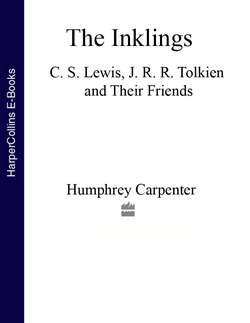Читать книгу The Inklings: C. S. Lewis, J. R. R. Tolkien and Their Friends - Humphrey Carpenter - Страница 15
1 C.W.
Оглавление“The telephone bell was ringing wildly, but without result, since there was no-one in the room but the corpse.’
It was a conventional beginning to what at first sight appeared to be a conventional detective story. An unidentified man is murdered in the offices of a publishing company. There are a number of suspects. Inspector Colquhoun investigates.
But, when the book was published in 1930, readers soon discovered that it was not exactly like that. The corpse, it appeared, was only the introduction to the real story: the discovery of the Holy Grail in a country church, its theft by a black magic enthusiast, and the attempt of an Anglican parson and a Roman Catholic Duke to rescue it. Nor did even this seem to be entirely what the story was about, for the pursuit of the Grail (or ‘Graal’ as the author spelt it) was soon giving place to visionary experiences and the contention of the forces of good and evil. As Inspector Colquhoun remarked in Chapter Sixteen, ‘What an infernally religious case this is getting!’
The book was called War in Heaven, and it was the first novel to be published by Charles Williams.
*
By that time – 1930 – the name ‘Mr Charles Williams’ was a familiar sight on the list of evening classes arranged by the London County Council at the City Literary Institute and at Evening Institutes in many parts of the metropolis. Here, in bare buildings with naked light-bulbs, people of all ages and types and levels of education would come for a couple of hours each week, to sit in echoing lecture rooms and study the subject of their choice. Those who opted for English Literature would soon find themselves being lectured to by a thin man with round spectacles, a high forehead, and a long upper lip. He talked in a lower middle-class London accent, and the vowels of his speech seemed at first to contrast oddly with his manner, which was quite unlike that of any other Evening Institute lecturer. Sitting on a table and often moving his arms and hands in dramatic gestures, he spoke passionately and without ceasing. Most people gave up trying to take notes.
His lectures were usually on major poets, especially Milton, Shakespeare, and Wordsworth, though sometimes he talked about modem poetry or even (though the classes were supposed to be in English Literature) on Dante. People who came hoping for plain information were taken aback, for, though he chose his words with great precision, he mentioned few facts. Nor did he offer the usual sort of critical opinions. Indeed he did not really discuss
